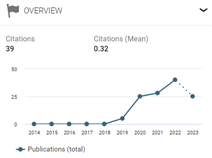Pengalaman dosen dalam penggunaan simulasi sebagai metode pembelajaran di Akademi Keperawatan Ibnu Sina
DOI: 10.30867/gikes.v5i3B.2085Abstract
Background: The application of simulation method is one of the keys to improve students' practical skills. However, many lecturers face challenges in integrating simulation effectively, mainly due to limited facilities, lack of training, and difficulty in measuring learning impact.
Objectives: This study aims to explore how lecturers' experiences in implementing simulation methods, especially related to the strengths, challenges, student responses and the role of institutions related to simulation methods.
Methods: This design is a qualitative study with a descriptive phenomenological approach involving seven nursing educators with in-depth interviews at the Akademi Keperawatan Ibnu Sina Kota Sabang. Data analysis used the Miles and Huberman Model which refers to data collection, data reduction, data presentation, and drawing conclusions.
Results: There are four main themes in this study, namely the strengths of the simulation method, challenges of the simulation method, student responses and the role of educational institutions.
Conclusion: The simulation method makes students more interactive, makes it easier to elaborate on the topics being studied, make decisions, gain direct experience, think critically and work together in a team.
Keywords
Full Text:
PDFReferences
Akselbo, I., Killingberg, H., & Aune, I. (2020). Simulation as a pedagogical learning method for critical paediatric nursing in Bachelor of Nursing programmes: a qualitative study. Advances in Simulation, 5(1), 1–9. https://doi.org/10.1186/s41077-020-00140-2
Bodil, B., Madangi, B. P., Ralaitafika, H., Ersdal, H. L., & Tjoflåt, I. (2022b). Nursing students’ experiences with simulation-based education as a pedagogic method in low-resource settings: A mixed-method study. Journal of Clinical Nursing, 31(9–10), 1362–1376. https://doi.org/10.1111/jocn.15996
Decormeille, G., Huet, N., Poiroux, L., Servotte, J. C., Cerfon, C. H. H., Foronda, C. L., Castelao, E. L., Couarraze, S., & Geeraerts, T. (2022). Use of Screen-Based Simulation in Nursing Schools in France: A National, Descriptive Study. Clinical Simulation in Nursing, 73, 6–16. https://doi.org/10.1016/j.ecns.2022.09.004
Edward, M. I., & Chukwuka, L. (2020). Simulation in Nursing Education : Implications for Nurse. Africa Journal of Health, Nursing and Mdwifery, 3(1), 12–23.
Haddeland, K. (2020). Effects of Using High-Fidelity Simulation on Nursing Students’ Recognition of and Response to Deteriorating Patients [Doctoral Dissertations]. University of Agder.
Koukourikos, K., Tsaloglidou, A., Kourkouta, L., Papathanasiou, I. V., Iliadis, C., Fratzana, A., & Panagiotou, A. (2021a). Simulation in clinical nursing education. Acta Informatica Medica, 29(1), 15–20. https://doi.org/10.5455/AIM.2021.29.15-20
Maclean, S., Geddes, F., Kelly, M., & Della, P. (2019). Realism and presence in simulation: Nursing student perceptions and learning outcomes. Journal of Nursing Education, 58(6), 330–338. https://doi.org/10.3928/01484834 20190521-03
Mishra, R., Hemlata., & Trivedy, D. (2023). Simulation-based learning in nursing curriculum- time to prepare quality nurses: A systematic review and meta-analysis. National Library of Medicine, 9(5). 10.1016/j.heliyon.2023.e16014.
Mohamed, S. A., & Fashafsheh, I. H. (2019). The Effect of Simulation-Based Training on Nursing Students’ Communication Skill, Self-Efficacy and Clinical Competence for Nursing Practice. Open Journal of Nursing, 09(08), 855–869. https://doi.org/10.4236/ojn.2019.98064
Orr, Z., Machikawa, E., Unger, S., & Romem, A. (2022). Enhancing the Structural Competency of Nurses Through Standardized Patient Simulation. Clinical Simulation in Nursing, 62, 25–30. https://doi.org/10.1016/j.ecns.2021.09.005
Perekuu, T., Atinga, B.-E., Henyo, A., & Addah, G. G. (2022). Clinical Competency: Simulation Compared with Lectures in Training Registered General Nursing (RGN) at Time of Completion of Program—A Systematic Review. Open Journal of Nursing, 12(01), 60–69. https://doi.org/10.4236/ojn.2022.121005
Sengupta, M., & Tungoe, LC., (2021). Knowledge on Simulation based learning in Nursing Education among Nursing Fraternity in selected Nursing Institutions of India. Asian Journal of Nursing Education and Research, 11(3). 10.52711/2349-2996.2021.00098
Sharoff, L. (2022). Faculty’s Perception on Student Performance using vSim for Nursing® as a Teaching Strategy. Clinical Simulation in Nursing, 65, 1–6. https://doi.org/10.1016/j.ecns.2021.12.007
Tjoflåt, I., Brandeggen, T. K., Strandberg, E. S., Dyrstad, D. N., & Husebø, S. E. (2018). Norwegian nursing students’ evaluation of vSim® for Nursing. Advances in Simulation, 3(1). https://doi.org/10.1186/s41077-018-0070-9
Wang, Y., & Yuan, H. (2022). Nursing undergraduates’ experiences of a simulation-centred educational program in hospice care in Macao: A qualitative research. International Journal of Nursing Sciences. https://doi.org/10.1016/j.ijnss.2022.09.005
Refbacks
- There are currently no refbacks.















